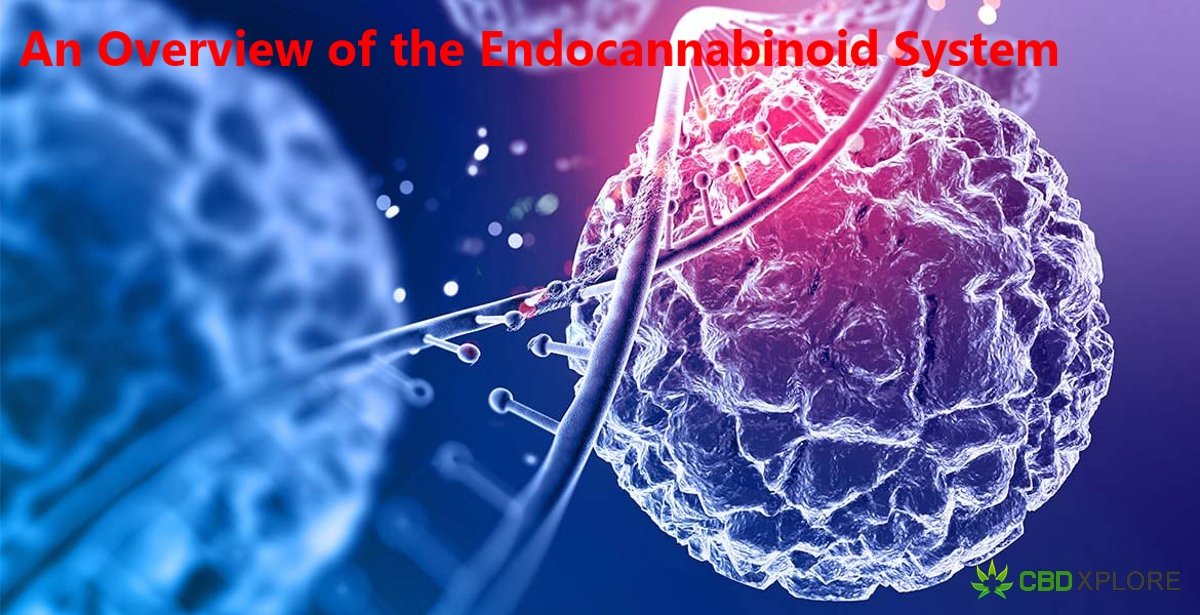An Overview of the Endocannabinoid System

The endocannabinoid system (ECS) regulates critical body activities such as mood, sleep, memory, and appetite. When the ECS is out of balance or not functioning effectively, our health and wellness suffer.
The ECS has only recently been discovered. The system was discovered by scientists in the early 1990s while researching how cannabinoids found in the cannabis sativa (C. sativa) plant interact with the human body.
The ECS still has a lot to teach us. However, it is believed that cannabinoids, like CBD, interact with cannabinoid receptors in the body to produce beneficial effects.
Explore the Contents
What Exactly Is an Endocannabinoid System?
The endocannabinoid system (ECS) is a complex network of cell signaling that runs throughout the body. Experts describe the ECS as an “essential component of the health and healing of every person, and practically every animal.”
Endocannabinoids interact with receptors to assist rectify an issue when a system in the body is out of balance. Cannabinoids have a structure similar to endocannabinoids and can so attach to cannabinoid receptors and generate similar effects.
Read More: The Changing World of CBD for Sports
What Is the Endocannabinoid System In Charge Of?
Our endocannabinoid system is in charge of preserving physiological and biochemical balance. Its major purpose is to keep our bodies and minds in a state of homeostasis, or balance.
Homeostasis refers to your body’s efforts to maintain equilibrium. It seeks to keep your internal physiological systems steady and optimal regardless of what is going on around you.
When your stomach growls, it’s your ECS telling you that you need to eat because you’re running low on fuel. Here are some of the most important processes associated with the ECS:
- Stress and mood
- Hunger and digestion
- Inflammation and pain during sleep
- Memory and learning
- The liver’s function
- Motor command
- Skin condition Nerve function
All of these functions help to maintain homeostasis, which ensures that your internal environment is stable and working optimally.
The Endocannabinoid System: A Link Between the Body and the Mind
With its complicated activities in our brain system, immunological system, digestive system, and all of the body’s organs, the serves as a link between the body and mind.
More specifically, the ECS governs the above-mentioned functions that our mind causes us to feel in the first place.
The ECS works by interacting with cannabinoid receptors in certain organs. CB1 and CB2 receptors are the two principal cannabinoid receptors that have been identified thus far. Each has a varied effect on different sections of the body.
CB1 receptors appear to control peripheral operations in organ systems and our immune system, whereas CB2 receptors appear to control actions in the central nervous system and brain.
Let’s look at an example of how the ECS connects our body and mind. If you break your arm, the area of your body that is in pain communicates with your brain via receptors. Because the ECS regulates pain, it attempts to keep it within tolerable bounds.
Naturally, it appears that there are multiple bridges connecting the body and mind. The ECS is in charge of maintaining homeostasis and ensuring that vital biological systems run smoothly.
Read More: CBD for Beginners: Getting Started
What Effect Does CBD Have on the ECS?
Because everyone has an ECS and the system’s principal function is to maintain homeostasis, you may be questioning why we need CBD at all. If the ECS is not operating properly in the body, it may require some assistance in regaining balance. ECS dysfunction can induce a variety of symptoms, both physically and psychologically.
Because cannabinoids and endocannabinoids have similar structures, they can have similar actions.
While specialists are unsure how CBD interacts with the ECS, they do know that it does not bind to CB1 and CB2 receptors like THC. Instead, they believe that by preventing endocannabinoids from degrading, CBD keeps them in peak operating order, allowing them to have a greater impact on the body.
Regardless of how it works, research indicates that CBD may have a good effect on the ECS as well as overall health and well-being. It has the ability to help quiet the mind, boost mood, encourage a good night’s sleep, and more.
Endocannabinoid Deficiency: What Is It?
Cannabinoids affect us via interacting with our ECS. The body is unable to carry out normal homeostatic activities if it does not manufacture enough endocannabinoids. Clinical endocannabinoid deficit is the scientific term for this problem (CECD).
An endocannabinoid shortage, according to cannabis expert Dr. Ethan Russo, maybe the core cause of a variety of maladies and disorders. It could explain why some people get fibromyalgia, migraines, irritable bowel syndrome, and other comparable diseases.
Although the deficit is still a research topic, it may explain why CBD medicines that target endocannabinoid production may be useful.
If your is under stress, cannabinoid supplements, such as full-spectrum CBD oils, may help enhance levels and restore equilibrium.





